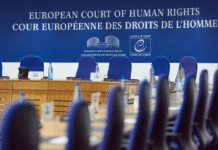
The European Court of Human Rights (ECtHR) ruled Tuesday that Turkey had violated multiple provisions of the European Convention on Human Rights (ECHR) by keeping prominent Kurdish politician Selahattin Demirtaş in prolonged pretrial detention over his alleged role in violent protests in southeastern Turkey in 2014, Turkish Minute reported.
Demirtaş, a vocal critic of the Turkish government and President Recep Tayyip Erdoğan, was initially arrested in November 2016. His detention was related to the deadly protests that erupted in 2014 over Turkey’s perceived inaction during the Islamic State in Iraq and the Levant’s assault on the Kurdish town of Kobani in Syria.
Although his release was ordered in 2019 following a prior ruling by the ECtHR, Demirtaş was almost immediately re-arrested on reclassified charges involving the same events.
Demirtaş, 52, was among 108 former pro-Kurdish Peoples’ Democratic Party (HDP) politicians tried for allegedly inciting the protests. In May 2024 a high criminal court in Ankara sentenced him to 42 years in prison, a ruling that he is currently appealing. The HDP has since been succeeded by the Peoples’ Equality and Democracy Party (DEM Party).
In Tuesday’s decision the European court found that Demirtaş’s pretrial detention from September 2019 until his conviction last May lasted more than four years without sufficient legal justification. It ruled by six votes to one that Turkey had violated Article 5 of the convention, which protects the right to liberty and security, and Article 18, which prohibits misuse of legal restrictions for political purposes.
The court said Turkish authorities failed to provide “reasonable suspicion” that Demirtaş committed a crime and that their actions appeared politically motivated.
“The measures taken by the authorities had been based on inadequate reasoning and had pursued an ulterior purpose, namely that of stifling public debate and limiting the scope of democratic debate,” the judgment said.
The court also criticized Turkey’s Constitutional Court for taking more than four years to review Demirtaş’s case, saying that delay violated the requirement for a speedy legal review.
It rejected the Turkish government’s arguments that the renewed detention was legally distinct from earlier cases, noting that the state provided no meaningful new evidence and had failed to justify reclassifying the charges directed at Demirtaş from “incitement” to “instigation” of the Kobani unrest.
The violent Kobani protests resulted in the death of more than 40 people and injuries to hundreds of others. According to public prosecutors, the violence had been prompted by the calls issued by the HDP and its co- chairman Demirtaş.
Demirtaş and other defendants have always denied the accusations and argued that their calls for solidarity with Kobani were democratic and within the framework of freedom of expression.
“The authorities appeared to have presented his calls for demonstrations as an instigation to insurrection and other serious offenses, without any evidence to that effect,” the ECtHR judgment said.
The court ordered Turkey to pay Demirtaş €3,245 in pecuniary damages, €32,500 in non-pecuniary damages and €20,000 in legal costs.
One judge, Saadet Yüksel of Turkey, dissented from the majority ruling.
In 2020 the court’s Grand Chamber had already found Demirtaş’s initial detention to be politically motivated and in violation of his rights. Tuesday’s ruling concluded that those violations had persisted during his renewed detention.
Turkey is bound by the court’s decisions as a member of the Council of Europe, though it has resisted prior calls to release Demirtaş. He remains imprisoned following the 42-year sentence imposed in the Kobani trial, which he is appealing.
The judgment is not yet final. Either party may request that the case be referred to the court’s Grand Chamber within three months.
Demirtaş’s imprisonment is widely seen part of a broader crackdown led by President Erdoğan on opposition figures and a tactic to silence political dissent in the country.














